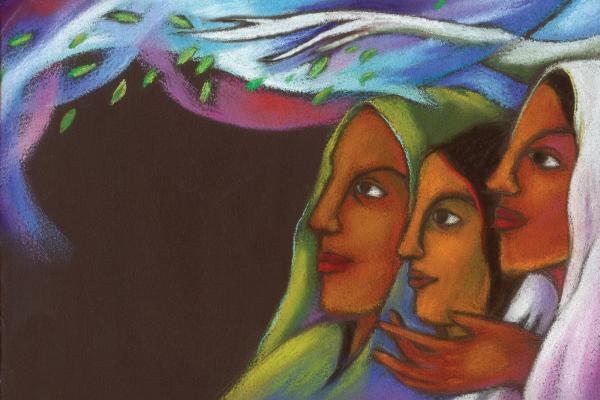DID MARY KNOW, on that puzzling and fateful afternoon when the angel Gabriel visited her, that she was about to join a line of mothers in Israel who would be remembered and honored within a tradition dominated by men?
Did she think of her forebear and namesake, Miriam, co-deliverer of her people from Egyptian slavery? Did Deborah, prophet and judge, come to mind—or Jael, the housewife who drove a tent peg into the brain of an enemy general? Had anyone told this nonliterate young woman about Huldah, the prophet and scholar who identified Deuteronomy as sacred scripture? Surely Queen Esther, who saved her people from a Persian pogrom, was known to Mary from the annual festival of Purim.
More likely Mary would have remembered women in Israel who gave birth to important men, such as Samson and Samuel. The late pregnancy of her cousin Elizabeth brought Isaac’s mother, Sarah, into view.
But her own premarital pregnancy may have reminded her more of Bathsheba, mother of Solomon. In this patriarchal culture, wives who could not conceive were disgraced and considered of little worth, but pregnancy before marriage could result in an honor killing. No wonder Mary fled to Elizabeth as the only person who might understand her unusual plight (Luke 1:39-45). Guided by the Holy Spirit, Elizabeth enabled Mary to turn her fear into a song of praise adapted from Hannah’s prayer after her son Samuel was born (Luke 1:46-56; 1 Samuel 2:1-10). God lifts up the lowly and brings down the proud.
If she pondered her place in Israelite history, did Mary also think of more-recent heroes? If Hanukkah was celebrated in Nazareth each year, she would have known how the second temple in Jerusalem had been rededicated to Yahweh after its desecration by the Seleucid ruler Antiochus IV, 160 years earlier. Hanukkah acclaimed the successful Maccabean revolt and subsequent Judean independence; it also exalted Judith, whose name means “Jewish woman”; she saved Israel from destruction by beheading the Assyrian general Holofernes.
Read the Full Article

